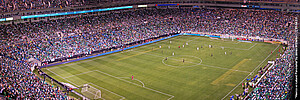Starting tonight and for one month, Europe will go with the flow of goals, defeats and victories of the UEFA European Championship. Two million spectators and eight million television viewers are expected. The timing could not be better for William Gasparini, sociologist in the laboratory “ Sport and social sciences”. Today is the last day of the series of conferences “What Euro 2016 tells us about Europe” that he organised within the framework of his Jean Monnet Chair1, the first chair dedicated to European Sports Studies. The purpose of this research programme is to experiment a new international and interdisciplinary scientific approach. “The aim is not to analyse what Europe does to sport, but to understand how sport creates an ordinary relationship to Europe and a kind of “Europeanisation” of the citizens”, the researcher explains.
Encountering the “other European”
From this perspective, football becomes a research subject in its own right. “Football is a pure product of Europe, closely related to its political, social and economic history”, William Gasparini confirms. More than any other European football tournament, the UEFA Euro is a window on the social representation of participating countries through their national teams. “For example, the German team remained monocultural until the 2000s. Because of changes in the citizenship code, the Mannschaft now includes players with Turkish, Ghanaian or Russian origins”, William Gasparini observes. Each Euro 2016 spectator and viewer is therefore given the opportunity to encounter the “other European”.
The echanted “Black-Blanc-Beur” parenthesis
Football as a vector of integration remains a questionable subject and each national representation needs to be put into context. Euro 2016 acts as a magnifying glass showing the diversity of social relationships and current issues in Europe. “ When remembering the enchanted “Black-Blanc-Beur” parenthesis on the years 1998 to 2000, it appears that the economic crisis and unemployment were far less developed than today, and the idea of national unity was present even within the government”, the researcher recalls. Although the social virtues of football are commonly accepted, its media coverage often exhibits its downward slide: corruption, scandals, racist stereotypes, communitarianism… Since the recent wave of terror attacks in Europe and especially in France, host of the tournament, security issues are also part of the game.
William Gasparini concludes: “Even if you are not a football fan, you cannot escape the debates and controversies set off by the tournament. The question of national identity raised by the absence of Karim Benzema in the French team is one example. One way or another, something will spark your interest.”
1 Chair of European Studies (2015-2018) awarded by the European Commission within the framwork of the Erasmus + programme.
















